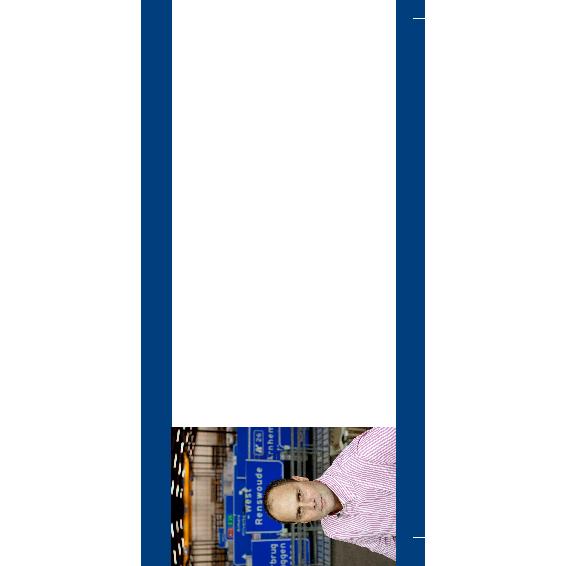
The decision in October of 2010 to put Agmi up for sale brought
upawholeseriesofquestions."Dowewantafinancial,orastra-
tegicpartner?WhattypeofinvestorswouldbestfitAgmi?What
process do we use, do we set up an auction or are we going to go
exclusive?Werealizedweneededcorporatefinancespecialiststo
guide us through this thinking process and help us search for new
investors." Out of a number of advisers, Holland Corporate Finance
was selected to lead the sale of Agmi. According to Zwart, they
understood best the situation Agmi was in and what it was look-
ing for. "On top of that, there was a personal connection. And that
always works quite well for me, dealing with people who are both
competent and genuinely nice."
A speed bump
The sale proceeded smoothly until a speed bump was hit on April
1st. Zwart received a phone call from Holland Corporate Finance
and was told that ABN Amro Participaties, as part of its due diligence
process, was going to send over a team of 40 students to take stock
of Agmi's inventory. To ensure an accurate outcome, Agmi would
have to shut down production for two days. Zwart nearly exploded.
"I told them: Over my dead body! If they go through with it, I will
call the whole deal off." Afraid that Zwart might indeed pick up the
phone and start telling ABN Amro what he thought of them, he was
called again ten minutes later and asked to check the date. "Just a
practical joke from the boys. Afterwards we had a good laugh, but
atfirstInearlylostit."InMay2011,lessthansixmonthsafterthe
decision to put the company up for sale, Agmi found in ABN Amro
Participatiesthestrongfinancialpartnerithadbeenseeking.The
new owners found in Agmi a company with a huge growth potential
that they could use as a platform for their buy-and-build strategy.
Guiding people
As a company that began in 1947 as a manufacturer of holy wa-
terfontsandcrucifixesAgmihasthuscomealongway.Guiding
people to their destination has always remained Agmi's core busi-
ness, though when Zwart took over in 2006, Agmi was primarily a
producer of ordinary road signs. "Its administrative and reporting
structureswerefine,butbothproductionandmarketing&sales
were in a very bad shape," recalls Zwart. To him, Agmi presented
just the challenge he was looking for. He had always wanted to
run his own business-to-business production company to which he
could add his commercial expertise. A successful international ca-
reer at OcÚ, the printer and copier multinational, had gradually lead
him away from that goal. "As you move upward in big companies,
you become more of a manager and less of an entrepreneur. You
findyourselfsittinginmeetingswhereyoudiscusshowtomanage
all the complexity around you, instead of contributing solutions that
reduce complexity and generate business."
At Agmi Zwart started to do just that. He makes it sound as if turning
around Agmi was only a matter of being pragmatic and using com-
mon sense: attract the right people, make sure they know exactly
what they need to do, stop any activity that does not add value. He
insists that in essence most things are in indeed very simple, but
that too many people have a tendency to make them too complex.
"Do you know Bram Ladage in Rotterdam? He became a multi-
millionaire by selling french-fries. Not just ordinary fries, but the
best fries in town made from fresh potatoes that he put on display
outsidehisstalls.Nowismakingfriesdifficult?No.Isitexciting
business? No. The same is true for road signs. If you make sure
they are the best in the market and keep in mind that you are in a
commodity business, you can be very successful."
Pragmatism and common sense
Adding a healthy dose of pragmatism and common sense is, how-
ever, not the whole story. Whilst Agmi invested in improvements in
HRM, IT, logistics and manufacturing, it was particularly successful
in product innovation and new business development. Agmi now
supplies90%ofthebigbluetrafficsignsabovetheNetherlands
motorways; three years ago it had no share of that market at all.
"We won that business not only because our signs are cheaper,
in many ways they are much better as well. They are lightweight,
better readable, modular, easier to install, and so on." Agmi also set
its sights on the market for tunnel systems, and within half a year it
won the contract for a prestigious project. For the new Coentunnel
nearAmsterdam,Agmiwillsupplyandservicealltrafficandsafety
signs, the innovative led-lighting system it developed in-house and
the communications system that integrates all these parts.
Agmi holds one more trump card up its sleeve. Zwart shows a pro-
duction plant that is almost empty but will soon be occupied by a
45-metre long welding robot. It will produce the giant portals that
stretchacrossmotorwaystosupporttrafficsigns.Nottheheavy
steel structures that you see nowadays, but lightweight, modular
onesmadeofaluminiumthatofferawholerangeofbenefitsto
customers. "The market is hardly aware yet that we're coming, but
we expect to conquer half of it within the next two years."
Quite content
While Agmi heads into a bright and exciting future, Zwart seems
quite content with his life after the deal. Initially he had planned
to leave entirely after the sale of the company, but was later per-
suaded to stay on for a year or so. Now he can see himself stay
even longer. "I enjoy my current role at Agmi enormously. As long
as I can contribute by guiding it in the right direction and by block-
ing anything or anyone who wants to add unnecessary complexity,
I'm happy to stay. But I also cherish my freedom. Why should I
take on more responsibilities and thereby limit myself again? In my
personal life, I try to achieve the same as at Agmi: I don't want it to
be more complex than its needs to be."
| | | | | | | | | | | | | | |
| | | | | | | | | | | | | | |
| | | | | | | | | | | | | | |
42
43

